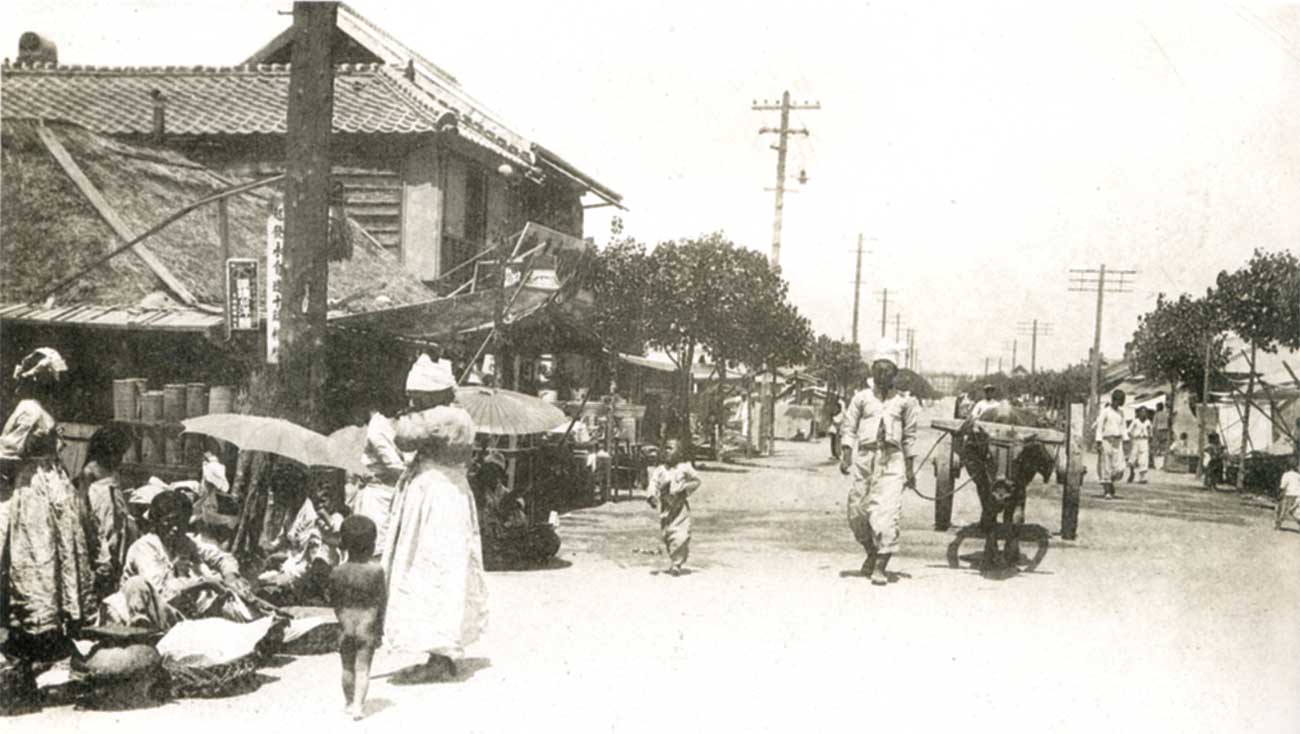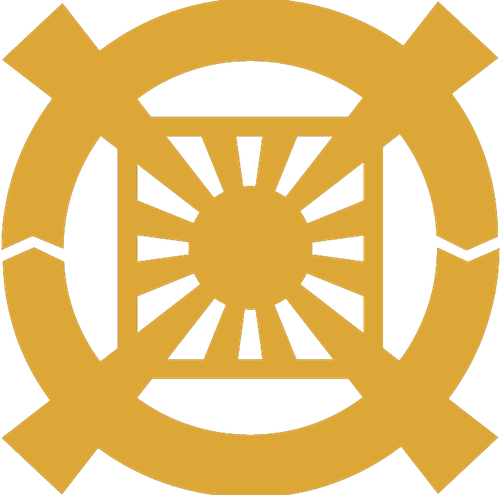Not only our immediate family, but even my uncle respected me more than his children. My uncle said, “Where’s Yong-myung? Where’s that good singer, Yong-myung?” [Editor’s note: Father’s name as a child was Yong-myung.] My uncle loved me more than he loved his children.
When we came home from school, my uncle wouldn’t buy candy for his children even if they asked him to; instead, he would take money that might have gone for candy and put it in my back pocket without my noticing. When I asked, “What’s this?” He would say, “What do you mean, ‘what’s this?’ I’m giving it to you for your tuition.”
So I asked, “Why? You cannot even educate your children.”
And he replied, “Yeah, well, my children are like this, like that, but if you do well, my children will be blessed.” He thought that they would be blessed through me.
Moon Gyung-chun was my father’s cousin. He lived next door to us. He was short and fat. My father was the oldest son in his family, and I was his second son. That cousin of my father’s always said, “That young kid was born at the wrong age.
That kind of boy can only become a king or a traitor. He can’t become a king nowadays, so there’s nothing left for him to become but a traitor.” Relatives of mine still sometimes tell this story, too, right? [Yes.]
1926–1932: Studying Chinese Classics
When I was ten years old, I had to read a book a day at my village school. I finished it in thirty minutes. If I concentrated, I could get everything into my brain within thirty minutes. I then had to recite it in front of my teacher.
If I could memorize everything in thirty minutes, how could I sit all day long in class reciting what Confucius and Mencius had said? [Laughter] My teacher often used to take a nap during the day, so after finishing everything, I used to go and spend time in the mountains while my teacher was sleeping.
Originally, Korean life was close to Confucianism. I read The Analects of Confucius and Mencius’ writings. I was a person talented in all directions. Furthermore, I was good at drawing pictures, too. When I was twelve years old, I drew stylish Chinese characters for my village school.
When I went to the village school when I was small, my teacher gave a lecture on several verses from The Analects of Confucius and Mencius. The next morning, we had to recite that lecture back to the teacher. If we could not, we were punished. I remember being punished.
1933: Unyong Institute
In those days, there were prep schools for entering higher schools, such as college. Mine was in Wonbong-dong. You could go to a prep school before the government assigned you to a higher school, but you had to go and take a test before going being assigned to the higher school. A prep school was an in-between educational institution. I encouraged my cousins to go to prep school.
We did research before choosing a school. In April, we all had to go to school. My parents had paid all the money for tuition to this village school, but I wanted to escape from that school without even going there for a year.
I had persuaded my parents, my grandfather, and even my uncle by saying, “When other people are building airplanes, I can’t just be studying Confucius and Mencius.” This is how I argued.
I was a very ambitious person. I thought I would die if I could not get three doctorates in my lifetime. However, I now think of a doctorate as among the easiest things to get. …
1934: Osan Elementary School
I studied at Unyong Prep School and then entered what was called a general school, Osan Elementary School. I took an examination to transfer and entered the third grade there. Furthermore, I studied so desperately that my grades for the year were good enough for me to be permitted to skip to the fifth grade.
At that time, I walked twenty li to school. This was when I went to the Osan School. How far is that? [Eight kilometers.] I walked eight kilometers to school every day.
Because I always passed the houses of other children who lived on the way to school at the same time every day, if they left home with me, we were never late for school. It was almost scientific.
Children were therefore waiting for me on every mountain pass. [Laughter] When I walked, I walked very fast. I walked the eight kilometers in an hour or even forty-five minutes. Those following me were working very hard! [Laughter] There are many stories like this about me.
My parents never needed to prepare school things for me. I did everything by myself. Even when I had to take an oral examination in front of the headmaster, I arranged everything myself. I was a pioneering type.
Becoming a Christian
I was born in a very stable Confucian family in a northern province of Korea. When I was a little over ten years old, my entire family converted to Christianity.
Converting was for me deeply moving. I loved my new faith, and I loved Jesus more than I had loved anyone else in my life.
When I was small, whenever I was late for a service, I could not raise my head. Without repenting for several days, I was unable to walk with my head raised. I still remember this clearly. I always felt that if I arrived late, it would inconvenience all the other people attending the service, so I always tried to arrive at the service a little before it began. Furthermore, I tried to be as helpful as possible.
I’m sure you all know that Korea then was a small, sad Asian country under Japan’s control. I did not grow up in an independent, sovereign state. Furthermore, I grew up under Japanese sovereignty, Japanese domination.
That was how it was until I was twenty-five. I recall gradually beginning to understand the world during that important stage of my life, my youth; it was a time when, as a Korean without independence, I came to understand all of life’s difficult circumstances.
If I look at the situation from the providential viewpoint, I grew up within my nation’s difficult circumstances. The misery of my people who were living under another nation caused feelings to arise from deep in my heart. My memories are of a youth spent thinking of how to deal with my country.
Transferring to the Fourth Grade
The Osan School prohibited the use of Japanese. We weren’t allowed to speak that language there. [Editor’s note: By the later years of the Japanese occupation, school children were generally being taught in Japanese.]
Lee Sung-hun, who was one of the thirty-three signers of the Korean Declaration of Independence from Japan, established the school. With that kind of tradition as the school’s foundation, we simply could not speak Japanese.
When I thought about it, I felt we needed to understand our enemies very well. Unless we thoroughly understood our enemies, we could not prepare to fight against them when we had to.
For that reason, I took a transfer exam for Chongju General School, a public elementary school, where I had to enter the fourth grade, which I otherwise would have skipped.
I learned to speak Japanese fluently there, and I graduated from there. During this process, I was thinking about all the difficult questions and basic problems of life, such as the proper way of faith.
At school, we all had to learn Japanese. It seems like only yesterday that I studied hiragana and katakana. I memorized everything in one night. I also memorized all the books of the first, second, third, and fourth grades like a thunderbolt in just two weeks. After doing that, my ears were used to it.
At this school, for the first time, I hung up pictures I drew. I hadn’t even been taught how to draw, but I knew it already. Before I began drawing, I divided the picture into thirds.
I measured whether the picture fitted within the divisions of a plane. Based on the center point, I measured it. If my drawing paper were three times bigger, based on the center point, I would draw dots first in the places that matched. That’s how I drew.
In my early years, when I used a notebook, I did not start writing where the lines were. I always started from the white area at the top of the page. At times, I even wrote on top of what I had written before. In that way, I was able to write more things in a single notebook. We must appreciate the value of things.
From the time I was an elementary school student, I watched the school principal’s behavior and continuously trained myself to live as he did. Even now, when I pray, I focus on things I learned back then.
Have you all seen a kerosene lamp? [Yes.] It seems like yesterday that I studied while pouring the kerosene in like this. When I studied until two or three o’clock, my parents would say to me, “Hey! Go to sleep.
You’re going to ruin your health.” They always talked like that. In those days, my closest friends were the night insects. I made friends with them during the hot summer.
I still remember what happened at the Chongju Elementary School graduation ceremony. Many fathers, brothers, teachers, and supporters came to Chongju to celebrate on graduation day.
At that time, Chongju was a town. At the graduation ceremony, there was a speech by the headmaster and then a congratulatory speech by a guest. Thereafter, I volunteered to go on stage and speak. I gave a speech against the Japanese occupation. I still remember this.
Furthermore, I can still see myself giving that speech in front of all those people. When I think about that, I realize I did not have the temperament of an ordinary boy.



